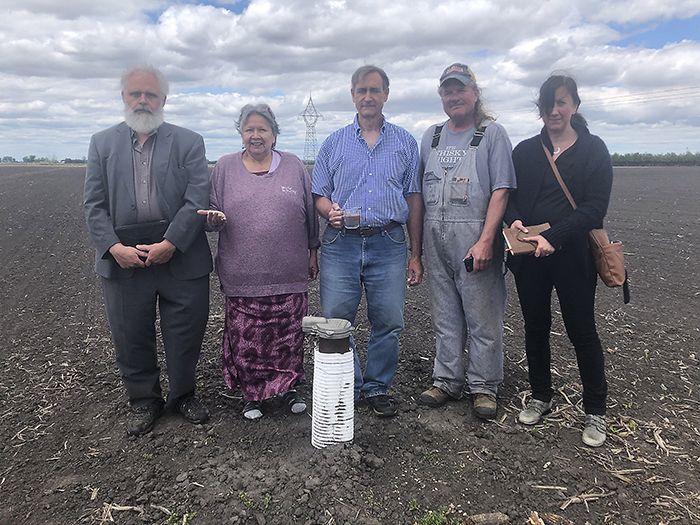
By Pam Wright
Local Journalism Initiative Reporter
Dave Lusk really misses his well.
Dug in 1965, the well at his Greenvalley Line farm supplied pure, cold water for some 53 years before it failed in 2018.
Lusk believes the well was spoiled as the direct result of the impact of wind turbines on the aquifer.
“This is green energy,” said Lusk, “but if it takes away something as important as our water…is it really that green?”
Lusk is among the property owners who banded together as part of the Water Wells First (WWF) group dedicated to finding solutions for property owners with ruined water wells.
Last week, WWF held a press conference at Lusk’s farm to raise awareness on the issue with organizers inviting all candidates seeking election in the Lambton-Kent-Middlesex riding.
WWF co-founder Kevin Jakubec showed off a cupful of powdery grey dust said to come from Lusk’s well.
A video of the well from July 2018 was also played. It shows discoloured water and gas belching from the top of the well pipe.
Jakubec said well problems have been ongoing for Dover area residents since 2012, when the East St. Clair Wind Farm was built.
Residents in the former Chatham Township have been having issues since the construction of North Kent Wind I began in 2017.
Jakubec said property owners remain concerned, saying a recently released provincial health study on the water well problems fell short.
He’s now calling on incumbent MPP Monte McNaughton to host a town hall meeting to address problems associated with the Ministry of Health’s All Hazard Investigation.
“The Ford government has failed us,” Jakubec said, adding many constituents feel “short changed,” as affected Dover area residents were excluded from the study.
As a member of the opposition, McNaughton took up the cause for water wells in 2017. While campaigning in 2018, McNaughton promised affected constituents a health study on the well water.
The Ministry of Health report, completed by a five-member expert panel, was released last month. It examined water well quality in North Kent, near the North Kent 1 wind farm.
A synopsis of the 2,201-paged document stated water quality in the area was poor as indicated by “numerous exceedances,” adding quality declined between 2017 and in 2021 when the investigation took place.
The North Kent wind farm was built in 2017 and went operational in 2018.
The Ministry of Health study did not directly point at the wind farm as the cause of the problem, but it also did not absolve the construction and operation of the turbines.
The report did back up claims of fouled wells by property owners, adding it was consistent with interference that could “potentially” be connected to wind turbine construction.
Jakubec said the report misses the mark on health risks.
“We need to know the maximum level of sediment that can’t be exceeded,” Jakubec explained. “If we know that, we can adequately filter the water.
“You have to define safe,” he said. “You have to know what it is.”
The safe limits of heavy metals, sediment and gases needs to made available, Jakubec added.
Only Vanessa Benoit of the NDP and Dean Eve of the None of the Above Direct Democracy Party attended the press conference.
Both Benoit and Eve said they’d get to the root of the problem if elected.
“This is a prime example of what we are trying to stand up for,” Eve said of the water well issue. “In a true democracy, there has to be full accountability and full transparency.”
Benoit said it was “completely unacceptable” the water well issue has dragged on so long.
Benoit told Lusk and Jakubec that they have her word.
“I will do everything I can to advocate for you,” she said.
Lusk said his well failed at the same time construction crews were pile driving while building the 34-turbine North Kent Wind Farm 1.
Since 2018, he’s been hauling municipal water for personal consumption and use at his own expense.
“My well water has Kettle Point black shale in it,” Lusk said, admitting the experience has scarred him.
“We used to be able to get a cold drink out of the tap on a hot day,” he added. “Those days are over.”
Lusk, who was not among the 61 property owners to take part in the investigation, said he didn’t trust the company who did the water study, noting they’re associated with the wind turbine company.
He’s fed up.
“Lie after lie,” Lusk said. “How long will they try to cover this up? And at what cost?”
Recommendations from the panel indicate additional water sampling needs to be done to provide a larger base of data.
In previously published reports, McNaughton said more information is needed, adding he was concerned with a low participation rate in the study.






